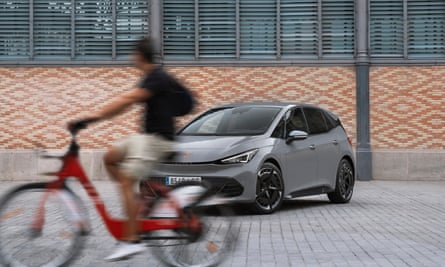
From budgeting to emissions to tax efficiency, there’s plenty to consider when you’re looking for your perfect company car. Stephen Briers, editor of industry bible Fleet News, explains the most important things to bear in mind before you sign on the dotted line.
Purpose driven
The very first thing you need to do before deciding on a company car is to ask yourself a simple question: what do you actually need it to do?
“There are a number of things to consider before you make a decision,” says Briers. “How will the car work for your career, if you’re using it for your job, but also how does it fit into your lifestyle needs? If you’ve got a family, you need to factor in size requirements. If you have a preference for performance you need to think about that too, as well as interior quality, and fuel type – will the type of mileage that you do suit an electric vehicle.”
With most companies replacing their car every three or four years, Briers also points out the importance of forward planning: “Think about how your personal circumstances might change over that period of time, rather than just simply choosing something that might suit you today.”
Spend and save
The next big consideration is, of course, budget. How much is the car going to cost you to run?
“There are two major elements to this, from a company car point of view,” says Briers. “First up there’s the benefit-in-kind (BiK) taxation, which is the amount that you pay to use the car privately based on CO2 emissions. If you were looking at the best performing petrol and diesel cars, they’ve got a BiK figure in the mid-20% range at best, whereas electric cars are currently 2% BiK. That could be the difference between paying a few hundred pounds a year for a high-quality electric car, like a CUPRA Born, and several thousand pounds for a mid-market diesel car.”
The second major element of cost is your fuel budget. It’s still cheaper to charge an electric car at home than pay the pump price for petrol or diesel. “While you’ll get reimbursed for business mileage, consider how many private miles you travel per year,” says Briers. “Then you can work out potential savings from choosing an electric vehicle.”

Clean slate
With the climate crisis taking centre stage for individuals and companies alike, the issue of emissions has become increasingly dominant. The post-pandemic landscape, with hybrid working here to stay, means people are driving less and thinking more about pollution at a local level.
“More and more people are choosing plug-in hybrids and electric vehicles from a pollution point of view,” says Briers. “The registration figures bear that out – electric vehicles are experiencing huge growth. Many bigger companies are transitioning across to EVs rapidly. A lot of them have got 2025 deadlines to move everything across to electric.”
Pure EVs such as the CUPRA Born also come with an element of future-proofing that current diesel and petrol vehicles lack.
“You can expect clean air zones to develop, like they are in Oxford, to zero-emission zones,” says Briers. “And there are now a number of other cities that are looking at zero-emission zones. So, if you’re able to choose an EV, then at least you know that you’ll be able to go everywhere at any point. And should that legislation get tighter in the next two or three years, you’re going to be OK.”
Safe travels
Most new cars offer an array of cutting-edge safety technology and driver aids, but it’s worth checking how much of this equipment comes as standard on your new company car. While many of the latest models, such as the CUPRA Born, have impressive levels of standard safety kit, many other marques offer features such as crash avoidance, lane-keeping assist and drowsiness alert only as costly options.

“Safety technology is just accelerating all the time, so it’s best that you have all the latest driver assistance systems on-board,” says Briers. “You need to look at what safety technology is available as standard or as options. Look at cars that are five-star rated under the Euro NCAP car safety performance programme.”
The right connection
Connectivity is an increasingly crucial factor driving company car choice, especially for professionals on the move, for whom productivity is paramount. So, it’s essential that whatever car you choose delivers on that front when it comes to having the best, latest and most intuitive technology.
“For a lot of drivers, staying connected is the most important consideration when they’re selecting a car,” says Briers. “The options that you’ve got with the infotainment screen, linking your phone for access to apps, opening up information on route planning or nearby parking or weather are very important.”
Pillar of support
If you’re using your car primarily for business, you need to ensure that any problems with the vehicle can be sorted out as quickly as possible.
“The level of service that you get can vary a lot by different franchises,” says Briers. “You need to have a strong relationship with your local dealer, the one that will prioritise the fleet repairs, so you’ll get your car back on the road as quickly as possible should something go wrong.”
Briers suggests getting advice from your fleet manager on supportive franchises before you commit to a specific make of vehicle.
Worth the wait?
With global supply chains under unprecedented stress since the pandemic, a new and significant factor when it comes to company car choice is the issue of delivery times.
“This has become a big issue in the past couple of years and will certainly remain so for the next 18 to 24 months,” says Briers. “There’s a huge shortage of available vehicles due to a lack of semiconductors and other key components – you’ve got models that are now on order lists that are stretching out 12 to 18 months into the future. So, you really need to make a choice about how long you’re prepared to wait to receive your next company car.”
Happily, such long delivery times don’t apply to the CUPRA range, with the Born, for instance, usually available within six to nine months.
Make sure your next company car ticks all the right boxes: visit the CUPRA for Business website and explore the range, including the new all-electric Born – the car that puts the excitement back into business